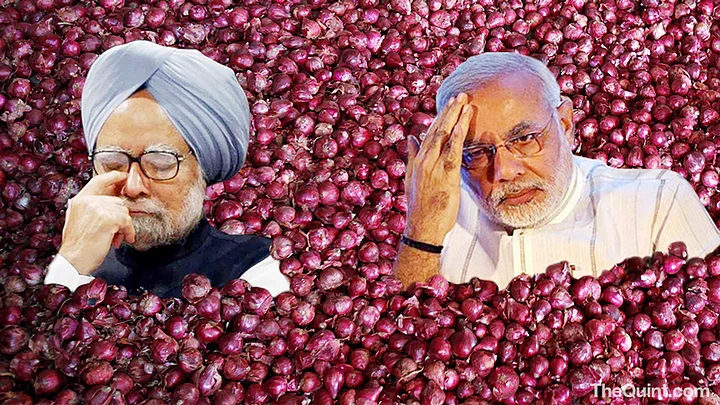Long before there was Anna Hazare, we had the humble onion to credit for bringing down governments.
500 kms from the anti-corruption crusader’s village is Lasalgaon – the largest wholesale market of onions in India. Delay in supply from this wholesale mandi, among others, has led onion prices to skyrocket in Delhi. Currently being sold at Rs 80/kg, this upward spiral should be closely monitored by the government.
Reason?
The Onion Election
Let us rewind to the 1980 General Election, or the “Onion Election” as Indira Gandhi called it. Rising onion prices contributed to the fall of the first non-Congress government post-Independence. But within a year, onions were making Prime Minister Indira Gandhi cry when prices shot up to an unthinkable Rs 6! Again, this was 1981, so save the eyeroll.
During the winter session of Parliament that year, Lok Dal’s Rameshwaram Singh walked into the Rajya Sabha wearing a garland made of onions. When Singh complained to the Chairman of the House M Hidayatullah about rising onion prices, he shot back saying – “Let’s see what you will wear when the prices of tyres go up or for that matter the prices of shoes.”
The rest of the country was certainly, not laughing.
The Bleak Diwali of 1998
The next jolt was felt around Diwali in 1998. The festivities were bleak, but politicians still retained their sense of humour. Congressman Chhagan Bhujbal sent a box of onions to the then Maharashtra Chief Minister Manohar Joshi and explained – “Diwali is a festival where you give something precious. This time, onions are very precious.”
An embarrassed Joshi was then forced to relent and made onions that were being sold for Rs 45/kg in Mumbai, available for Rs 15/kg to ration card holders.
Jaspal Bhatti and the Onion Chronicles
But India’s ace comedian and satirist Jaspal Bhatti trumped everyone else. A November 9, 1998 report from the India Today archives elaborates:
He (Jaspal Bhatti) first created a flutter by arriving in a city market flanked by black-cat commandos. His logic: buying a precious commodity like onions warranted exceptional protection.
Later that month, Bhatti organised a fashion show in Chandigarh’s Sector 17 with models walking down the ramp wearing onions.
It Were Onions That Stood Between Sushma Swaraj and Delhi
Things, however, got serious for the BJP later that year when the Delhi assembly elections were held. In a pre-election manoeuvre, Sushma Swaraj was appointed as Chief Minister, just 40 days before Delhi went to vote. Despite her best efforts at setting up Fair Price Shops, and quashing rumours about scarcity of onions and other essential commodities like salt, there was no coming back for Sushma or the BJP. Onions were selling for 40-50/kg at that time.
The “Grave Concern” of 2010
Along with Delhi, the BJP also suffered a stinging defeat in Rajasthan credited to the lowly onion. After his loss, Chief Minister Bhiaron Singh Shekhawat was famously quoted as saying – “The onion was after us.”
In 2010, tables turned when errant rainfall in onion producing regions led to a country-wide shortage of onions. Recognising the political dangers of expensive onions, an otherwise reticent Prime Minister Dr Manmohan Singh described it as a “grave concern”. Exports were stopped, import duties were cut and the government appeared to be in damage control mode. But a 2012 study by the Competition Commission of India suggests the government was up against a factor it had little control over – pure simple greed.
The competitive assessment of onion markets states:
In December 2010, retailers’ markup over the wholesale market price was more than 150% in almost all major markets in the crucial weeks. Therefore, the December 2010 episode was not simply a demand and supply problem
The Formidable Onion
But the heads-up of 2010 did little to soften the August 2013 blow. Prices shot up to Rs 100/kg in some parts of north India, forcing the country to float a tender to import onions from Pakistan, Egypt and China. Rise in price of onions and other essential commodities pushed inflation, making the UPA II even more nervous as it prepared for Assembly elections in crucial states like Delhi and Rajasthan. The Congress was comprehensively routed in both states.
See the full circle now?
To give sole credit to onions for any of the electoral defeats may be a stretch, but its one veggie no Indian politician wants to mess with.
(At The Quint, we question everything. Play an active role in shaping our journalism by becoming a member today.)
